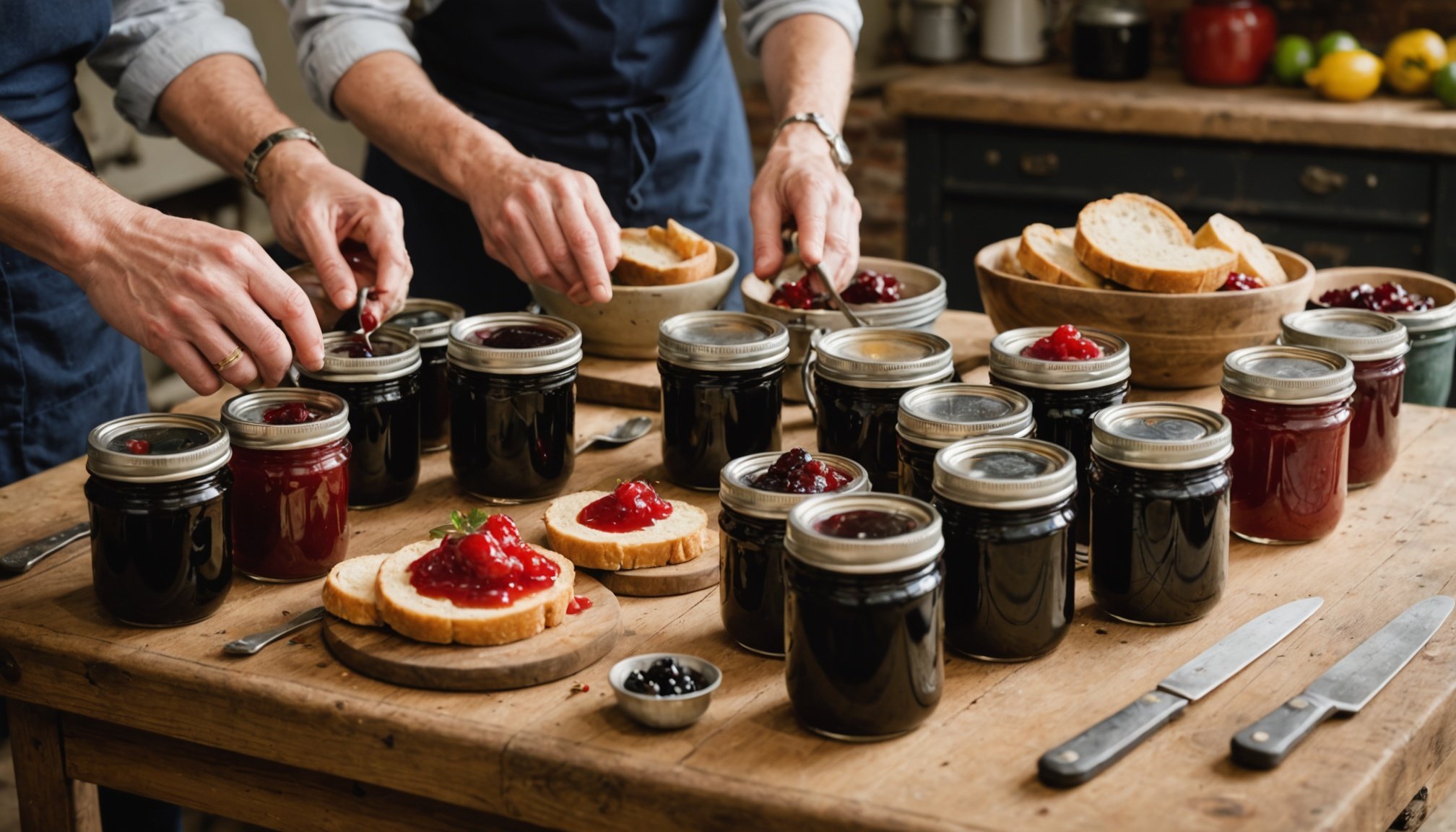Overview of British Jam-Making Workshops
British jam-making has evolved from a simple kitchen activity to an immersive cultural experience. These hands-on workshops celebrate a tradition deeply rooted in Britain’s culinary history. Jam-making dates back centuries, beginning as a method to preserve fruits during harvest season. Today, it remains an integral part of festivities and daily life, offering a glimpse into the past while engaging with modern culinary practices.
Participating in a jam-making workshop offers numerous benefits. Attendees acquire skills in preserving fruits and learn about ingredient selection, which aids in creating diverse flavors. Workshops also promote community bonding as participants share techniques and stories. Such experiences are invaluable for travelers wanting an authentic slice of British culture.
Have you seen this : Explore the best dickensian literary tours across the uk: an immersive journey into charles dickens” life and legacy
The popularity of jam-making workshops among travelers continues to rise, as they offer unique insight into local customs. These workshops provide an opportunity to step into a traditional kitchen setting and partake in an activity beloved by generations. By understanding the cultural significance behind the craft, tourists can enrich their travel experiences, making memories that resonate beyond the process itself. With their growing appeal, these workshops offer a delightful mix of tradition, learning, and social interaction.
Types of Workshops Available
Delving into the world of jam-making workshops unveils a variety of styles catering to different interests and learning preferences. Each workshop offers a unique experiential learning opportunity.
Also to see : Uncover somerset”s hidden gems: a journey through the art of traditional british cider making
Traditional Jam-Making Workshops
These workshops focus on age-old techniques and classic ingredients, providing an authentic experience for those wishing to connect with centuries-old tradition. Participants typically learn methods honed over generations, using local fruits and time-tested recipes.
Modern Fusion Jam Workshops
In contrast, modern fusion jam workshops offer a twist on the conventional, introducing innovative flavor combinations and cutting-edge techniques. These sessions appeal to adventurous participants eager to experiment and create distinctive jams by blending traditional methods with contemporary culinary trends.
Private vs. Group Workshops
Choosing between private and group workshops can significantly affect the learning experience. Private sessions offer personalized instruction, tailored to individual progress and preferences. This setting is ideal for those seeking concentrated attention and a customised pace. Meanwhile, group workshops foster a sense of community, encouraging social interaction and collective learning. Participants benefit from shared tips and collaborative creativity. Each option has its merits, depending on personal learning styles and objectives.
Locations of Workshops
Exploring jam-making locations across the UK unveils a diverse tapestry of regions each offering unique experiences. UK regions like the historic countryside of Cornwall and the lush landscapes of Yorkshire beckon travelers with their artisanal jam-making workshops. These areas not only provide scenic backdrops but are also rich in fruit varieties ideal for crafting exceptional jams.
Notable venues such as the National Trust properties offer immersive cultural experiences, allowing participants to learn traditional methods in historic settings. Meanwhile, urban centers like London also host modern workshops combining classic techniques with fusion flavors, catering to diverse preferences.
When planning a visit, consider accessibility and travel tips. Many workshops are easily accessible via public transport or car, making them convenient travel destinations. Additionally, some venues offer accommodation packages, enhancing the overall travel experience.
It’s wise to check the seasons for fruit availability, as this can affect the workshop’s offering. Whether in bustling cities or serene countryside locations, each workshop promises an unforgettable journey into the heart of British jam-making culture, allowing travelers to embrace both the craft and the captivating environments in which it thrives.
Pricing and Duration of Workshops
Jam-making workshops present a delightful mix of learning and tradition, with costs varying based on several factors. Average workshop prices typically range from £30 to £100 per session, depending largely on the location, duration, and specific offerings included. Many workshops provide all necessary ingredients, offering a hands-on experience without hidden costs.
The duration of workshops can vary; most sessions last anywhere between two to four hours. This timeframe allows participants to engage in thorough experiential learning, ensuring attendees grasp essential techniques and processes. Some workshops may offer extended courses, ideal for enthusiasts wishing to dive deeper into the art of British jam-making.
When evaluating the value for experience, consider what is included in the price. Some workshops package their lessons with complementary items such as recipe booklets, tasting sessions, or even takeaway jars of your homemade jam. It’s crucial to weigh these extras, as they enhance the overall cultural experience and ensure a memorable adventure. This balance of cost and enrichment can guide potential attendees in making an informed decision, ensuring they fully appreciate the rich tradition of British jam-making.
Booking Options and Recommendations
For those eager to indulge in jam-making workshops, understanding how to book is key to ensuring a seamless experience. Most workshops offer online booking options, providing convenience and accessibility. Platforms like Eventbrite and local tourism websites often feature such workshops, delivering user-friendly interfaces for hassle-free reservations.
When making a reservation, consider exploring various platforms to compare workshop prices and features. Paying attention to reviews and testimonials on these platforms can aid in making informed decisions, as they reflect past participants’ experiences. Look for workshops that provide clear details on what is included in the booking, such as ingredients, tools, and any added experiences.
Having reliable customer service can enhance your booking experience, offering assurance should any issues arise. Many workshops provide prompt responses to inquiries via phone or email, ensuring potential participants feel supported and informed. Don’t hesitate to use these channels to clarify any concerns or details.
Finally, keep an eye out for seasonal offers or special packages; these can add value to your workshop experience. By preparing well and booking wisely, you can immerse yourself in the rich tradition of British jam-making with confidence.
Participant Reviews and Testimonials
Exploring participant reviews and testimonials unveils the vibrant experiences travelers encounter in jam-making workshops across the UK. These shared stories often highlight the joy of engaging in an authentic cultural experience, offering readers a personal glimpse into the workshops’ ambiance and instructional quality.
Highlighted Experiences
Many participants express delight in learning traditional methods, weaving tales of nostalgia as they connect with British heritage through hands-on workshops. Experiences often emphasize the satisfaction derived from crafting jam with locally sourced fruits and sharing the fruits of their labour, quite literally. These workshops aren’t just about making jam; they’re about cultural immersion, where learning and laughter combine.
Common Feedback Themes
Feedback frequently touches on the expertise of instructors and the inclusivity of workshops, accommodating diverse skill levels and preferences. Comments about the welcoming atmosphere and sense of community are prevalent, illustrating the social aspect of these experiences. However, some participants note variances in workshop quality, indicating a need for thorough research beforehand.
Impact of Reviews on Choosing Workshops
Insightful testimonials play a crucial role in decision-making, guiding potential participants toward workshops that align with their interests. By evaluating these reviews, travelers can anticipate the nuances of various workshops, ensuring a memorable and culturally enriching experience.
Tips for Travelers
Participating in jam-making workshops is an enriching cultural experience, yet preparation can enhance it further. Ensuring you are equipped with essential items can make your workshop more enjoyable. A sturdy apron and a notebook are advisable to jot down personal recipes or notes.
Culturally, understanding etiquette elevates the experience. The British place value on punctuality, so timely arrival to workshops shows respect. Listening attentively during instructions and actively participating foster a positive environment. It’s essential to embrace the cultural engagement aspect, which bridges traditional practices with modern interactive learning.
Incorporating jam-making workshops into a larger itinerary allows for a more immersive travel experience. Consider visiting local farms where fruits are sourced to gain deeper insight into ingredient selection. Exploring surrounding regions enhances the appreciation of British culinary landscapes and traditions.
Workshops often offer takeaway goodies—your own crafted jams or recipe cards—making perfect souvenirs or gifts. Integrating these cultural elements into your journey breathes life into British history and culinary skills, offering a multidimensional travel adventure. Such experiences go beyond mere activity, weaving themselves into the fabric of meaningful, lasting travel memories.
Significance of British Jam-Making
The cultural significance of British jam-making is deeply intertwined with the country’s rich heritage. Historically, jam-making served as a crucial method for preserving fruits during abundant harvests, ensuring a vital source of nutrients during leaner months. This practice has evolved into a beloved food tradition, linking the past with the present.
The continuation of these workshops plays a pivotal role in preserving British culinary heritage. By engaging in these activities, participants are not only learning a skill but also becoming custodians of a tradition passed down through generations. Whether using traditional methods or exploring contemporary interpretations, every batch of jam made honours these age-old practices.
Beyond its historical and practical importance, jam-making fosters social and community ties. This activity is more than a culinary endeavour; it is a communal experience that brings people together, encouraging storytelling, sharing, and learning. Such social interactions reinforce community bonds, making jam-making an emblem of unity and collaboration within British society.
Thus, British jam-making is more than a kitchen task—it’s a living tradition, a celebration of community, and a testament to the country’s enduring culinary legacy.










